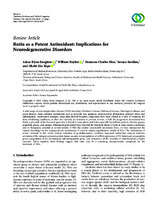Rutin as a potent antioxidant: implications for neurodegenerative disorders

View/
Date
2018Author
Enogieru, Adaze Bijou
Haylett, William
Hiss, Donavon Charles
Bardien, Soraya
Ekpo, Okobi Eko
Metadata
Show full item recordAbstract
A wide range of neurodegenerative diseases (NDs), including Alzheimer’s disease, Parkinson’s disease, Huntington’s disease, and
prion diseases, share common mechanisms such as neuronal loss, apoptosis, mitochondrial dysfunction, oxidative stress, and
inflammation. Intervention strategies using plant-derived bioactive compounds have been offered as a form of treatment for
these debilitating conditions, as there are currently no remedies to prevent, reverse, or halt the progression of neuronal loss.
Rutin, a glycoside of the flavonoid quercetin, is found in many plants and fruits, especially buckwheat, apricots, cherries, grapes,
grapefruit, plums, and oranges. Pharmacological studies have reported the beneficial effects of rutin in many disease conditions,
and its therapeutic potential in several models of NDs has created considerable excitement. Here, we have summarized the
current knowledge on the neuroprotective mechanisms of rutin in various experimental models of NDs. The mechanisms of
action reviewed in this article include reduction of proinflammatory cytokines, improved antioxidant enzyme activities,
activation of the mitogen-activated protein kinase cascade, downregulation of mRNA expression of PD-linked and proapoptotic
genes, upregulation of the ion transport and antiapoptotic genes, and restoration of the activities of mitochondrial complex
enzymes. Taken together, these findings suggest that rutin may be a promising neuroprotective compound for the
treatment of NDs.
